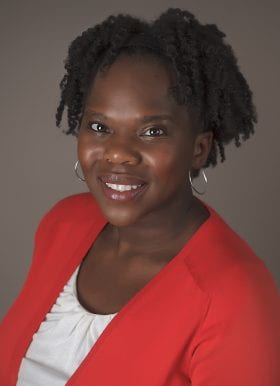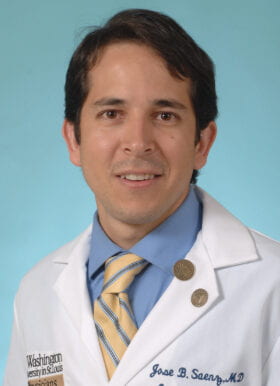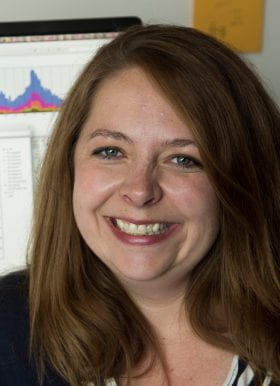Directors

Felicia Gomez, PhD
Assistant Professor of Medicine
- Email: fgomez@wustl.edu
Dr. Gomez is an Assistant Professor in the Griffith and Fehniger Laboratories at the McDonnell Genome Institute and The Department of Medicine –Division of Oncology at Washington University School of Medicine. Dr. Gomez completed her undergraduate training at Skidmore College in Saratoga Springs, NY, and she completed her doctoral training in human evolutionary genetics with Drs. Sarah Tishkoff (UPenn) and Alison Brooks (GWU). Currently, Dr. Gomez is leading a deep sequencing analysis of Hodgkin lymphoma genomes with the goal of describing somatic events characteristic of this malignancy. Dr. Gomez collaborates with members of the Griffith and Fehniger laboratories on projects related to the genomics of Hodgkin and Non-Hodgkin lymphomas. Dr. Gomez’s research goals include developing strategies to translate genomic data into improved patient care. She is specifically interested in working toward the inclusion of diverse human populations in translational genomic research.

José Sáenz, MD, PhD
Assistant Professor of Medicine
- Email: saenzj@wustl.edu
José B. Sáenz was born and raised in Miami, FL, and completed his undergraduate training at Cornell University. He is a graduate of both the Medical Scientist Training Program and, most recently, the Physician-Scientist Training Program at the Washington University in St. Louis School of Medicine. He completed his Internal Medicine training at Barnes-Jewish Hospital, followed by a Gastroenterology fellowship at the Washington University in St. Louis School of Medicine. José is currently an Assistant Professor in the Departments of Medicine and Molecular Cell Biology and the Coordinator for the Digestive Diseases Research Core Conferences in the Division of Gastroenterology. His research program is focused on understanding the host and microbial factors that contribute to the onset and progression of stomach cancer, a leading cause of cancer deaths worldwide. He is also involved in various programs aimed at advancing diversity and inclusion in medicine and in basic science.

Kristine Wylie, PhD
Assistant Professor of Pediatrics
- Email: kwylie@wustl.edu
Dr. Wylie is an Assistant Professor of Pediatrics. She received her PhD from Saint Louis University studying viral pathogenesis and completed her postdoctoral work at the McDonnell Genome Institute at Washington University working on the Human Microbiome Project and other large-scale genomics projects. She subsequently joined the Department of Pediatrics where The Wylie Lab uses genomics, microbiology, and molecular biology to study infectious diseases in women and children in order to improve reproductive outcomes and child health. Dr. Wylie is the Co-director a Science Education Partnership Award (SEPA) at Washington University, a program aimed at enhancing bioinformatics and genomics research opportunities for local high school students from backgrounds that are underrepresented in research (URiR). Through the SEPA program and the Kornfeld Post-Bac program, she is working to eliminate obstacles between URiR trainees and potential research careers.
Current Post-Bacs
2024

Angel Obiorah
- Email: oangel@nospam.wustl.edu
- Graduated from Gustavus Adolphus College in 2024 with a Chemistry Major
- PSTP Mentor: Lance Peterson, MD, PhD in Kodi Ravichandran‘s lab

Athziri Marcial Rodriguez
- Email: athziri@nospam.wustl.edu
- Graduated from St. Olaf College in 2024 with a Biology Major
- PSTP Mentor: ZeNan Chang, MD, PhD in Jeffrey Gordon’s lab

Nicole Dallas
- Email: dallas@nospam.wustl.edu
- Graduated from Maryville University of St. Louis in 2024 with a Biochemistry Major
- PSTP Mentor: Michael Bern, MD, PhD in Tim Ley‘s lab

Porter Bischoff
- Email: bischoff@nospam.wustl.edu
- Graduated from Utah Valley University in 2024 with a Biology Major
- PSTP Mentor: Jesse Zaretsky, MD, PhD in Sidharth Puram‘s lab

Alondra Colon
- Email: acolon@nospam.wustl.edu
- Graduated from University of Puerto Rico – Ponce in 2024 with a Bachelor of Biomedical Sciences
- PSTP Mentor: Stefan Tarnawsky, MD, PhD in Matt Walter’s lab
Edel Edorh
- Email: edel@nospam.wustl.edu
- Graduated from Saint Louis University in 2024 with a Bachelor of Science in Neuroscience and Psychology
- PSTP Mentor: Zanetta Chang, MD, PhD in Tamara Doering’s lab
2023

Jocelyn Pauta
- Email: pauta@nospam.wustl.edu
- Graduated from Drake University in 2023; Bachelor of Science in Health Science
- PSTP Mentor: Ellen Schill, MD, PhD

Erick Samuel Ramirez Tovar
- Email: rsammy@nospam.wustl.edu
- Graduated from Saint Louis University in 2023 with a Neuroscience Major
- PSTP Mentor: Naina Rengarajan, MD, PhD in Gautam Dantas’ lab
- Sammy is working on characterizing microbes that colonize the skin. To this end, he is acquiring skills in collecting and biobanking human microbial specimens, whole genome DNA extraction, and computational analysis, and lastly how these microbes interact with the immune system in model systems.

Martin Jr (MJ) Ketcha
- Email: ketcha@nospam.wustl.edu
- Graduated from Grinnell College in 2023; Bachelor of Arts in Biological Chemistry
- PSTP Mentor: Christine Yokoyama, MD, PhD , in Marco Colonna’s lab ,
- Research Title: “The role of centrosomal proteins in epidermal homeostasis”